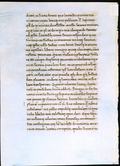Rochester Institute of Technology Leaf 39
This leaf comes from a rare manuscript of Livy's History of Rome (completed in about 9 A.D.) copied in Italy in the middle of the fifteenth century. It measures 22.5 x 16 cm and its vellum is very well prepared, though some rubbing of the ink has cast a shadow over the text block of some pages. The Humanistic script is crisp, clear, and without adornment; an exception is the Denison leaf, with its striking initial "H." See Denison University Leaf 39 for more information about this manuscript.
Text: This leaf contains the text of Livy's History, Book 29, Chapter 19. A scan of the recto is not currently available. The English translation is that of Cyrus Edmonds (1850), via Project Gutenberg.
 Rochester Leaf 39 Verso
Rochester Leaf 39 Verso
Rochester Institute of Technology Leaf 39 Verso
 Rochester Leaf 39 Verso Transcription
Rochester Leaf 39 Verso Transcription
dicere ac, si uera forent quae Locrenses quererentur, in carcere necari bonaque eius publicari: P. Scipionem quod de prouincia decessisset iniussu senatus reuocari, agique cum tribunis plebis ut de imperio eius abrogando ferrent ad populum: Locrensibus coram senatum respondere quas iniurias sibi factas quererentur eas neque senatum neque populum Romanum factas uelle; uiros bonos sociosque et amicos eos appellari; liberos coniuges quaeque alia erepta essent restitui: pecuniam quanta ex thesauris Proserpinae sublata esset conquiri duplamque pecuniam in thesauros reponi, et sacrum piaculare fieri ita ut prius ad collegium pontificum referretur, quod sacri thesauri moti aperti uiolati essent, quae piacula, quibus dis, quibus hostiis fieri placeret: milites qui Locris essent omnes in Siciliam transportari: quattuor cohortes sociorum Latini nominis in praesidium Locros adduci. Perrogari eo die sententiae accensis studiis pro Scipione et aduersus Scipionem non potuere. praeter Plemini facinus Locrensiumque cladem ipsius etiam imperatoris non Romanus modo sed ne militaris quidem cultus iactabatur: cum pallio crepidisque inambulare in gymnasio; libellis eum palaestraeque operam dare; aeque [segniter] molliter cohortem totam Syracusarum amoenitate frui; Carthaginem atque Hannibalem excidisse de memoria; exercitum omnem licentia corruptum, qualis Sucrone in
 Rochester Leaf 39 Verso Translation
Rochester Leaf 39 Verso Translation
...plead his cause; and, if the complaints of the Locrians were founded in truth, that he should be put to death in prison, and his effects confiscated. That Publius Scipio should be recalled, for having quitted his province without the permission of the senate; and that the plebeian tribunes should be applied to, to propose to the people the abrogation of his command. That the senate should reply to the Locrians, when brought before them, that the injuries which they complained of having received were neither approved of by the senate nor the people of Rome. That they should be acknowledged as worthy men, allies, and friends; that their children, their wives, and whatsoever else had been taken from them, should be restored; that the sum of money which had been taken from the treasures of Proserpine should be collected, and twice the amount placed in the treasury. That an expiatory sacred rite should be celebrated, first referring it to the college of pontiffs, to determine what atonements should be made, to what gods, and with what victims, in consequence of the sacred treasures' having been removed and violated. That the soldiers at Locri should be all transported into Sicily, and four cohorts of the allies of the Latin confederacy taken to Locri for a garrison." The votes could not be entirely collected that day in consequence of the warm feeling excited for and against Scipio. Besides the atrocious conduct of Pleminius, and the calamities of the Locrians, much was said about the dress of the general himself, as being not only not Roman, but even unsoldierlike. It was said, that "he walked about in the gymnasium in a cloak and slippers, and that he gave his time to light books and the palaestra. That his whole staff were enjoying the delights which Syracuse afforded, with the same indolence and effeminacy. That Carthage and Hannibal had dropped out of his memory; that the whole army, corrupted by indulgence, like that at Sucro in...